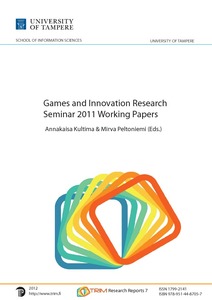Games and Innovation Research Seminar 2011 Working Papers
Teoksen toimittaja(t)
Kultima, Annakaisa
Peltoniemi, Mirva
Tampereen yliopisto
2012
Informaatiotieteiden yksikkö - School of Information Sciences
This publication is copyrighted. You may download, display and print it for Your own personal use. Commercial use is prohibited.
Julkaisun pysyvä osoite on
https://urn.fi/urn:isbn:978-951-44-8705-7
https://urn.fi/urn:isbn:978-951-44-8705-7
Tiivistelmä
The games industry carries the image of innovation and creativity, but still we know relatively little about the innovation processes that take place within the domain. To date, games and innovation have been studied in several disparate fields, including cultural studies, information sciences, design research and industrial economics and management. Perhaps due to such a fragmented nature of academic work on the subject, the bulk of the influential work on games and innovation is found in practically oriented guidebooks authored by experienced games industry experts (e.g. Adams, 2009; Salen& Zimmerman, 2003; Fullerton 2008).
In spring 2011 University of Tampere Game Research Lab in collaboration with Aalto University organized a working paper seminar with the aim of bringing together scholars of games and innovation from diverse fields and stimulating dialogue between them. Moreover, the goal of the seminar was to encourage the further development of rigorous academic research on the topic while keeping the work accessible to game professionals.
The collection of the seminar working papers presents an interesting variety of views from management of game production, philosophy behind game innovation and to the specific advancements in game innovations, such as avatar modification. The publication is also an image of the era: game cultures as well as tools and processes are going through constant changes and development.
In spring 2011 University of Tampere Game Research Lab in collaboration with Aalto University organized a working paper seminar with the aim of bringing together scholars of games and innovation from diverse fields and stimulating dialogue between them. Moreover, the goal of the seminar was to encourage the further development of rigorous academic research on the topic while keeping the work accessible to game professionals.
The collection of the seminar working papers presents an interesting variety of views from management of game production, philosophy behind game innovation and to the specific advancements in game innovations, such as avatar modification. The publication is also an image of the era: game cultures as well as tools and processes are going through constant changes and development.
